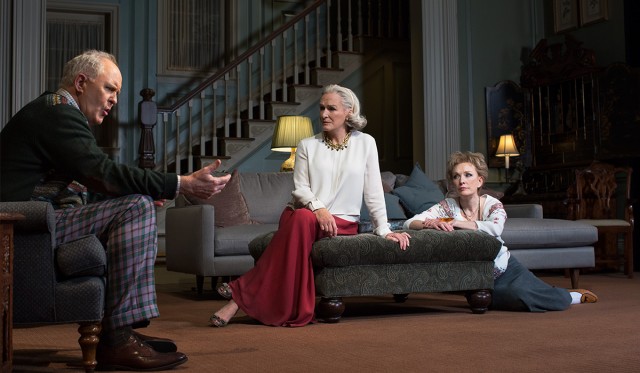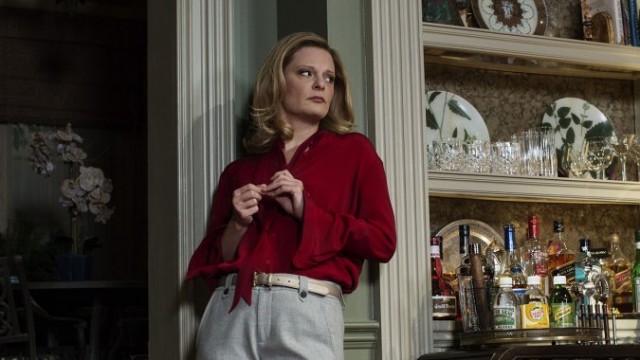
John Lithgow, Glenn Close, and Lindsay Duncan star in stellar Broadway revival of Edward Albee’s A DELICATE BALANCE (photo by Brigitte Lacombe)
Golden Theatre
252 West 45th St. between Broadway & Eighth Ave.
Tuesday – Sunday through February 22, $60 – $155
www.adelicatebalancebroadway.com
It seems that everyone wants to live with Agnes (Glenn Close) and Tobias (John Lithgow) in their elegant New England suburban home, but it’s hard to understand why in Edward Albee’s Pulitzer Prize–winning A Delicate Balance, running at the Golden Theatre through February 22. Tobias is a calm, retired businessman who likes to sit in his chair and read while sipping fancy cocktails. Agnes is a stern, cold woman who believes that “there is a balance to be maintained . . . and I must be the fulcrum.” They sleep in separate bedrooms and, while civil to each other, don’t seem to be particularly close anymore. Agnes’s wild and unpredictable sister, Claire (Lindsay Duncan), is already living with them. Tobias and Agnes’s thirty-six-year-old daughter, Julia (Martha Plimpton), has just left her fourth husband and is on her way to move back in with her parents yet again. But before Julia arrives, Tobias and Agnes’s best friends, Harry (Bob Balaban) and Edna (Clare Higgins), show up unannounced, claiming that they are too frightened to remain in their own house, quickly heading upstairs and locking themselves in Julia’s room. So when the bitter Julia returns home to find that her room is spoken for, the already none-too-happy woman gets even more upset. But since Tobias and Agnes both try to avoid confrontation, not much gets resolved in this growing household, even as secrets are being whispered and certain emotions are reaching the boiling point. It’s not quite as explosive as Who’s Afraid of Virginia Woolf, but it’s no barrel of laughs either. “Do we dislike happiness?” Agnes asks. Apparently, yes.

Daughter Julia (Martha Plimpton) brings the emotional angst to a boil in Edward Albee’s Pulitzer Prize–winning play (photo by Brigitte Lacombe)
Director Pam MacKinnon, who helmed the recent smash Broadway revival of Woolf as well as Bruce Norris’s Pulitzer Prize–winning Clybourne Park, lets the anger simmer before it erupts as the play examines themes of loss and fear. Agnes, who is questioning her sanity, is afraid of facing certain truths about her husband and her life, Tobias is frightened that Agnes will find out about his long-ago indiscretion, Claire is scared of being sober and responsible, and Julia is still terrified of growing up. Harry and Edna never reveal precisely what it was that drove them from their home, but they appear to be afraid of not being afraid. Albee, who also won Pulitzers for Seascape and Three Tall Women, captures suburban angst and WASP culture with his incisive, biting dialogue, which was written with very specific performance notes; in addition, most of the characters were based on relatives of his. The play has quite a history; the original Broadway production in 1966, starring Hume Cronyn (Tobias), Jessica Tandy (Agnes), Rosemary Murphy (Claire), Henderson Forsythe (Harry), Carmen Matthews (Edna), and Marian Seldes (Julia), won the Pulitzer and was nominated for a Tony. Thirty years later, the first Broadway revival won the Tony with another stellar cast: George Grizzard (Tobias), Rosemary Harris (Agnes), Elaine Stritch (Claire), John Carter (Harry), Elizabeth Wilson (Edna), and Mary Beth Hurt (Julia). And Tony Richardson’s 1973 film featured Paul Scofield (Tobias), Katharine Hepburn (Agnes), Kate Reid (Claire), Joseph Cotten (Harry), Betsy Blair (Edna), and Lee Remick (Julia). Nearly fifty years after its Broadway debut, A Delicate Balance still feels fresh and alive, poignant and relevant. In 1996, Albee wrote in an introduction to a newly published edition of the work, “The play does not seem to have ‘dated’; rather, its points seem clearer now to more people than they were in its first lovely production. Now, in its lovely new production (I will not say ‘revival’; the thing was not dead — unseen, unheard perhaps, but lurking), it seems to be exactly the same experience. No time has passed; the characters have not aged or become strange. . . . I have become odder with time, I suppose, but A Delicate Balance, bless it, does not seem to have changed much — aged nicely, perhaps.” It has aged nicely indeed, in yet another lovely production.